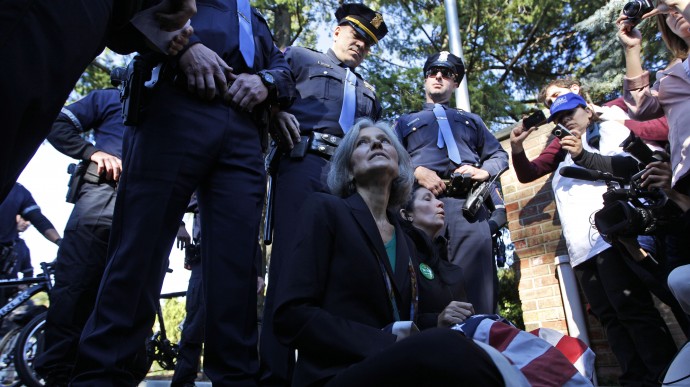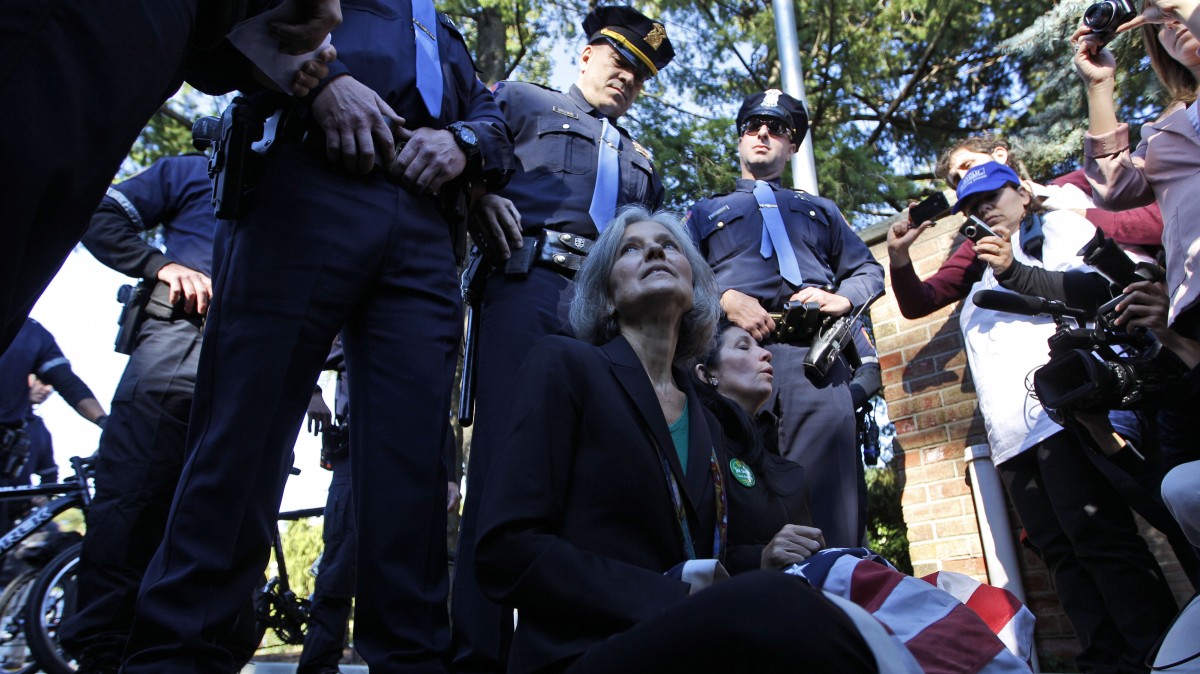
(MintPress) – Green Party presidential candidate Dr. Jill Stein and her running mate Cheri Honkala were arrested outside the presidential debates in Hempstead, N.Y. Tuesday. Although Stein, a Harvard educated pediatrician, has qualified on 85 percent of state ballots, she was barred from entering the Hofstra University debate, a decision that underscores the monopolization of national political debate by Democrats and Republicans.
The arrests of Stein and Honkala, third party supporters believe, stifles debate and demonstrates the bi-partisan collusion to control the Commission on Presidential Debates. Those seeking to reform the televised presidential debates believe that much of the conduct has been watered down because of strict controls on debate content, audience participation, and most importantly, airtime during the homestretch of the 2012 election.
Softball questions
Speaking before her arrest, Stein remarked on the purpose of the demonstration, saying, “We are here to bring the courage of those excluded from our politics to this mock debate, this mockery of democracy. If you have done the work to get on the ballot, if you are on the ballot and could actually win the electoral college by being on the ballot in enough states, then you deserve to be in the election and you deserve to be heard,” Stein announced to the police and crowd.
Stein added, “The American people deserve to hear choices which are not bought and paid for by multinational corporations and Wall Street. This is why we are not hearing the critical issues in this debate.”
The Commission on Presidential Debates, a semi-secretive federal agency controlled by Republicans and Democrats, refused to allow Jill Stein, libertarian candidate Gary Johnson and others to take part in debates.
Additionally, the Commission helps to create rules for how the two major party nominees debate. This, critics believe, has limited the integrity and openness of the debates, stifling debate and limiting audience interaction with the candidates.
While Obama and Romney have traded punches in two nationally televised debates this election season, the content and procedure of the discussions is jointly edited to ensure that candidates stick to less contentious topics and trade light jabs rather than engaging in a fair, open debate of the salient issues for voters this election season.
The Obama and Romney campaigns signed a memorandum of understanding before the first debate in Denver, Colo. Oct. 3. While the agreement contains the standard arrangements pertaining to debate locations, moderators and the length candidates can speak, there were also provisions critics believe limits the free exchange of ideas.
The document was released this week after watchdog groups and activists petitioned the Commission on Presidential Debates, just the fourth time a memorandum has been released to the public.
According to the memorandum, candidates are barred from addressing each other with proposed pledges, nor can the moderator ask candidates questions requiring a “show of hands” on a particular issue.
While the latest debate was designed to be a town hall style format where audience members can interact with candidates and ask questions, those who were allowed to ask questions were preselected by the moderator. However Cindy Crowley, the moderate at last night’s debate was barred from “coaching” those selected to ask questions.
Critics charge that in addition to keeping third party candidates from participating, the memorandum of understanding facilitated by the Commission on Presidential Debates seriously restricts the scope of debates and shows a lack of transparency throughout the debates, a time when undecided voters consider candidate positions.
Established in 1987, the goals of the bipartisan Commission are “to ensure that debates, as a permanent part of every general election, provide the best possible information to viewers and listeners.” However, the leadership is made up only on Democrats and Republicans, vetted by the party leadership, not through a participatory voting process.
A bevy of corporate and special interest sponsors, including Anheuser-Busch Companies, Southwest airlines and International Bottled Water Association (IBWA), fund the national debates and support the work of Commission, a troubling aspect for critics already decrying the influence of corporate and special interest money in elections.
The Commission on Presidential Debates
These issues, among others, drew Stein and Honkala to Hofstra University in a demonstration designed to bring attention to the plight of third party candidates.
The Green Party has run a campaign appealing to those opposed to virtually unregulated special interest money funding political action committees. According to their campaign platform, Stein and Honkala state, “Real people can’t afford to have two corporate parties — we have too much at stake. With your support, we will reach out to even more new voters to build support for a Green New Deal and fight for full employment, Medicare for All, and a government truly for and by the 99%.”
Just two independents — Joseph Lieberman (I-Conn.) and Bernie Sanders (I-Conn.) — are currently serving in Congress. Ross Perot was the most successful third party independent to run in a presidential election, capturing 19 million votes in the 1992 presidential race.
While Perot was a billionaire businessman, third party candidates typically receive a fraction of the major party funding. Barack Obama raised $181 million for his campaign last month while Mitt Romney raked in $170 million over the same period.
Jill Stein and Cheri Honkala, the most viable third party ticket within the moribund two-party system, have chosen to finance their election publicly, bringing in just $500,000 dollars this election season.
Funding plays an important role in a successful campaign, as the candidate with the highest fundraising total wins his election 9 out of 10 times, according to the Center for Responsive Politics. However, gaining national television exposure is also critical to increasing campaign visibility, credibility and popular appeal.
Open Debates, a non-profit advocacy group, has joined the call of third party candidates in an effort to “reform the presidential debates so that they better serve the interests of the American people.”
Ralph Nader, a former Green Party presidential candidate, has worked with the advocacy group in an effort to expand the number of debates while also opening the forum to third party candidates. Many within the group also would like to see more engagement with audiences while covering a broader set of voter concerns.
Greg Kafoury, an Oregon-based lawyer working with Nader to hold a debate in his state, believes that states and communities should democratically decide how they would like to hold debates, saying, “Success would be each community deciding the form of its own debate. Some might just want the two [main candidates], some might want three or four. Let the communities decide who’s going to be asking the questions. For example, how about some trial lawyers who know how to ask questions, instead of celebrity journalists?”


